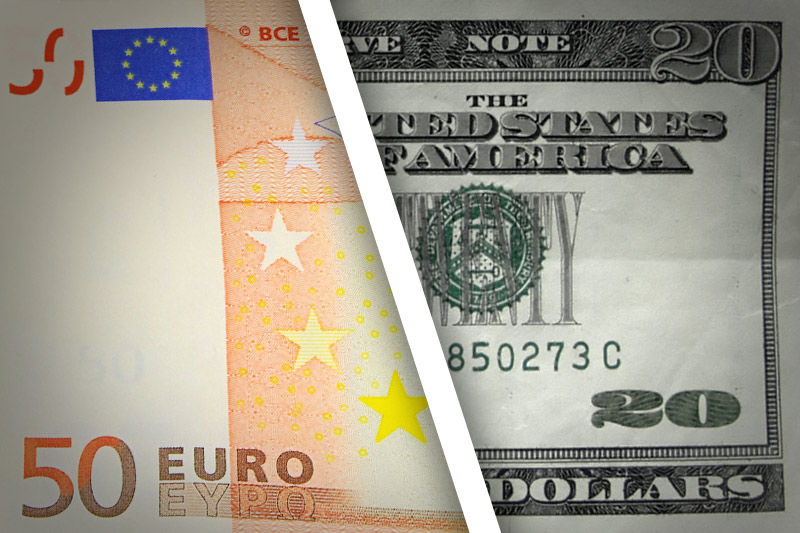Who is Kevin Hassett? Wolfe looks at the Trump ally tipped to become Fed Chair.
Investing.com - The euro pared losses against the U.S. dollar on Monday, after surprisingly weak U.S. retail sales data fuelled concerns that the economic recovery is faltering but the single currency remained under pressure from concerns over the debt crisis in Europe.
EUR/USD pulled back from 1.2176, the session low, to hit 1.2215 during U.S. morning trade, still down 0.28% on the day.
The pair was likely to find support at 1.2161, Friday’s low and a two-year trough and resistance at 1.2271, the session high.
The Commerce Department said U.S. retail sales fell by a seasonally adjusted 0.5% in June, confounding expectations for a 0.2% increase, after a 0.2% drop in May.
It was the first time retail sales had dropped in three consecutive months since late 2008.
Core retail sales, which exclude automobile sales, declined for the second consecutive month, dropping 0.4%, against expectations for an increase of 0.1%, after falling by 0.4% in May.
The data fuelled speculation over the possibility of another round of easing from the Federal Reserve, ahead of Fed Chairman Ben Bernanke's testimony on the economic outlook to the U.S. Senate on Tuesday and Wednesday.
In June, Bernanke said the U.S. central bank remained prepared to take additional steps to support economic growth if necessary, including additional asset purchases.
The greenback shrugged off a report showing that the New York Federal Reserve’s index of manufacturing conditions improved more-than-expected in July, as the employment index inched up.
The New York Fed said that its general business conditions index rose to 7.4 in July from 2.3 the previous month, outstripping expectations for a reading of 4.0.
But sentiment on the euro remained weak amid uncertainty over whether some bondholders could be forced to accept losses under the terms of Spain's bank bailout.
The yield on Spanish 10-year bonds rose to 6.81% earlier, re-approaching the critical 7% threshold, widely seen as unsustainable in the long run. The yield on Italian 10-year bonds ticked up to 6.16%.
Meanwhile, Germany’s constitutional court announced that it will deliver a ruling on whether the euro zone’s permanent bailout fund contravenes the German constitution on September 12, disappointing hopes for an earlier decision.
The euro slumped to a three-and-a-half year low against the stronger pound, with EUR/GBP down 0.38% to 0.7834 and fell to a six-week low against the yen, with EUR/JPY down 0.72% to 96.27.
Also Monday, the International Monetary Fund said it expects the global economy to expand by 3.5% in 2012, down from a forecast of 3.6% in April, and revised down its outlook for growth in 2013 to 3.9% from a previous forecast of 4.1%.
EUR/USD pulled back from 1.2176, the session low, to hit 1.2215 during U.S. morning trade, still down 0.28% on the day.
The pair was likely to find support at 1.2161, Friday’s low and a two-year trough and resistance at 1.2271, the session high.
The Commerce Department said U.S. retail sales fell by a seasonally adjusted 0.5% in June, confounding expectations for a 0.2% increase, after a 0.2% drop in May.
It was the first time retail sales had dropped in three consecutive months since late 2008.
Core retail sales, which exclude automobile sales, declined for the second consecutive month, dropping 0.4%, against expectations for an increase of 0.1%, after falling by 0.4% in May.
The data fuelled speculation over the possibility of another round of easing from the Federal Reserve, ahead of Fed Chairman Ben Bernanke's testimony on the economic outlook to the U.S. Senate on Tuesday and Wednesday.
In June, Bernanke said the U.S. central bank remained prepared to take additional steps to support economic growth if necessary, including additional asset purchases.
The greenback shrugged off a report showing that the New York Federal Reserve’s index of manufacturing conditions improved more-than-expected in July, as the employment index inched up.
The New York Fed said that its general business conditions index rose to 7.4 in July from 2.3 the previous month, outstripping expectations for a reading of 4.0.
But sentiment on the euro remained weak amid uncertainty over whether some bondholders could be forced to accept losses under the terms of Spain's bank bailout.
The yield on Spanish 10-year bonds rose to 6.81% earlier, re-approaching the critical 7% threshold, widely seen as unsustainable in the long run. The yield on Italian 10-year bonds ticked up to 6.16%.
Meanwhile, Germany’s constitutional court announced that it will deliver a ruling on whether the euro zone’s permanent bailout fund contravenes the German constitution on September 12, disappointing hopes for an earlier decision.
The euro slumped to a three-and-a-half year low against the stronger pound, with EUR/GBP down 0.38% to 0.7834 and fell to a six-week low against the yen, with EUR/JPY down 0.72% to 96.27.
Also Monday, the International Monetary Fund said it expects the global economy to expand by 3.5% in 2012, down from a forecast of 3.6% in April, and revised down its outlook for growth in 2013 to 3.9% from a previous forecast of 4.1%.
